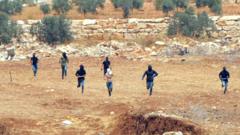As tensions rise between Israel and Iran, a recent missile attack on the Soroka Medical Center in Beersheba has prompted Israeli officials to announce intensified military operations aimed at Iranian strategic targets. This escalation follows the ongoing violence that has seen casualties on both sides.**
**Escalating Conflict: Israel and Iran Engage in Fierce Missile Exchanges**

**Escalating Conflict: Israel and Iran Engage in Fierce Missile Exchanges**
**Following a missile strike on a major hospital in Beersheba, Israel vows to step up its military response against Iran's nuclear infrastructure.**
The situation in Israel continues to deteriorate as the Iranian military launched a missile that directly struck the Soroka Medical Center in Beersheba. The Israeli military has confirmed the strike, which resulted in moderate injuries among patients and medical staff, leading to an urgent call for the public to avoid the area. Emergency services scrambled to control the blaze caused by the missile impact.
Israeli Defense Minister Israel Katz declared a mandate for a more aggressive military approach, stating the goal is to target important locations across Iran, including its nuclear sites, with the intent to neutralize perceived threats to Israel's national security. This escalatory strategy was prompted by ongoing missile strikes originating from Iran, following an extensive Israeli assault targeting Iranian military leadership and nuclear facilities.
Since the onset of hostilities, there has been a significant rise in the casualty counts attributed to the exchange of fire, with Israeli authorities reporting numerous injuries from the missile barrage. Cohen also highlighted that this hospital strike marked a troubling precedent as medical facilities should not be the target under international laws governing warfare.
Ayatollah Ali Khamenei, Iran's supreme leader, responded to the unfolding events with threats to retaliate against the United States should it join Israel in this confrontation. Tensions are further heightened as U.S. officials, including President Trump, weigh the implications of military actions, suggesting that American involvement could precipitate a broader regional conflict.
Amid warfare, Iran has experienced severe disruptions to its communications infrastructure, prompting concerns over civilian safety amidst military operations. Residents have reported difficulty accessing vital services and sharing information externally, as internet connectivity in the country fell to critical lows.
While both sides claim military actions are directed at strategic military objectives, reports from civilians and human rights officials indicate a high rate of civilian casualties, underlining the humanitarian impact of the escalating conflict. As diplomatic overtures are floated, including potential talks between U.S. and Iranian officials, the immediate outlook remains uncertain as military engagement shows no sign of abating.
Israeli Defense Minister Israel Katz declared a mandate for a more aggressive military approach, stating the goal is to target important locations across Iran, including its nuclear sites, with the intent to neutralize perceived threats to Israel's national security. This escalatory strategy was prompted by ongoing missile strikes originating from Iran, following an extensive Israeli assault targeting Iranian military leadership and nuclear facilities.
Since the onset of hostilities, there has been a significant rise in the casualty counts attributed to the exchange of fire, with Israeli authorities reporting numerous injuries from the missile barrage. Cohen also highlighted that this hospital strike marked a troubling precedent as medical facilities should not be the target under international laws governing warfare.
Ayatollah Ali Khamenei, Iran's supreme leader, responded to the unfolding events with threats to retaliate against the United States should it join Israel in this confrontation. Tensions are further heightened as U.S. officials, including President Trump, weigh the implications of military actions, suggesting that American involvement could precipitate a broader regional conflict.
Amid warfare, Iran has experienced severe disruptions to its communications infrastructure, prompting concerns over civilian safety amidst military operations. Residents have reported difficulty accessing vital services and sharing information externally, as internet connectivity in the country fell to critical lows.
While both sides claim military actions are directed at strategic military objectives, reports from civilians and human rights officials indicate a high rate of civilian casualties, underlining the humanitarian impact of the escalating conflict. As diplomatic overtures are floated, including potential talks between U.S. and Iranian officials, the immediate outlook remains uncertain as military engagement shows no sign of abating.





















